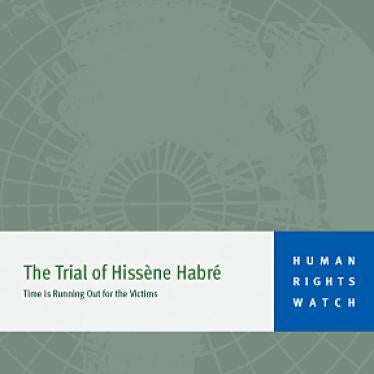(Dakar) – The placing of Hissène Habré, Chad’s former dictator, into police custody in Senegal on June 30 is a milestone in the long campaign to bring him to justice.
“The wheels of justice are turning”,said Reed Brody, counsel for Human Rights Watch who has worked with Habré’s victims since 1999. “After 22 years, Habré’s victims can finally see the light at the end of the tunnel.”Habré is accused of thousands of political killings and systematic torture during his presidency, from 1982 to 1990, when he was deposed by President Idriss Deby Itno and fled to Senegal. He has been living in exile in Senegal ever since. After a 22-year campaign by his victims, Extraordinary African Chamberswere established in the Senegalese court system in February to prosecute the worst crimes during his rule.
The chambers’ chief prosecutor, Mbacké Fall, asked to have Habré taken into police custody (garde à vue). Under Senegalese law, a person may be detained for up to 48 hours for investigation purposes if there is evidence to believe that they have committed an offense.The detention can be extended for another 48 hours with the prosecutor’s permission.The prosecutor is expected to bring charges (réquisitoire introductif) before the investigating judges of the chambers and request Habré’s indictment before his period of police custody expires. If Habré is indicted by the judges, he could be remanded to custody (mandat de dépôt) while the judges carry out their pretrial investigation.
The pretrial investigation is expected to last 15 months. It will potentially be followed by a trial in late 2014 or 2015.
“I have been waiting more than two decades to see Hissène Habré in court,” said Clément Abaifouta, president of the Association of Victims of the Crimes of Hissène Habré’s Regime (AVCRHH) who as a political prisoner during Habré’s rule was forced to dig mass graves and bury hundreds of other detainees. “We are finally going to be able to confront our tormentor and regain our dignity as human beings.”
Background
Habré’s one-party rule was marked by widespread atrocities, including waves of ethnic cleansing. Files of Habré’s political police, the Direction de la Documentation et de la Sécurité (DDS), which were recovered by Human Rights Watch in 2001, reveal the names of 1,208 people who were killed or died in detention, and 12,321 victims of human rights violations.
The United States and France supported Habré throughout his rule, seeing him as a bulwark against Libya’s Muammar Gaddafi. Under President Ronald Reagan, the United States gave covert CIA paramilitary support to help Habré take power.
Habré was first indicted in Senegal in 2000, but the country’s courts said that he could not be tried there, so his victims filed a case in Belgium. In September 2005, after four years of investigation, a Belgian judge indicted Habré and Belgium requested his extradition. Senegal refused to send Habré to Belgium, and spent the next three years stalling on a request from the African Union. Belgium then filed a case against Senegal at the International Court of Justice (ICJ).The court ordered Senegal on July 20, 2012 to prosecute Habré “without further delay” or to extradite him.
After Macky Sall’s election as president of Senegal in April 2012, Senegal and the African Union (AU) agreed on a plan to create Extraordinary African Chambers to conduct the trial within the Senegalese judicial system. The chambers can prosecute “the person or persons most responsible” for international crimes committed in Chad between June 7, 1982, and December 1, 1990.






